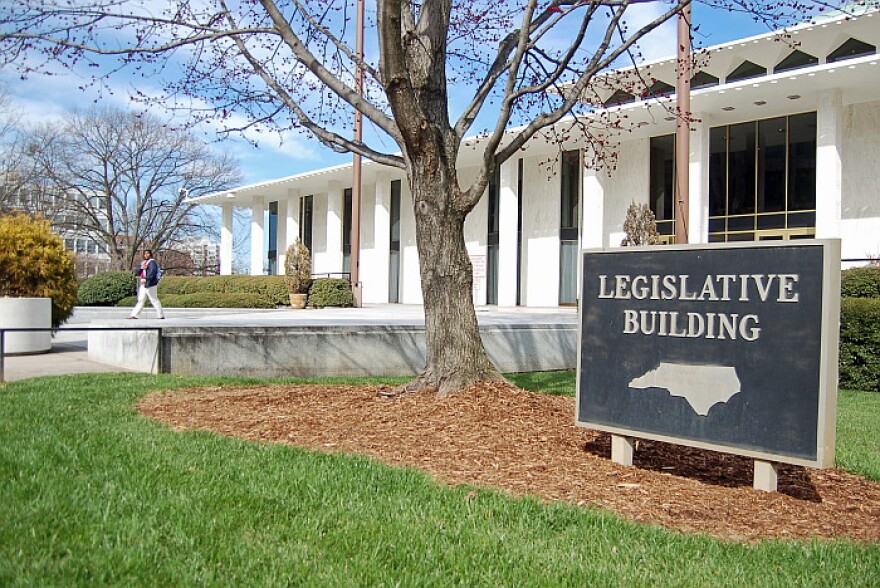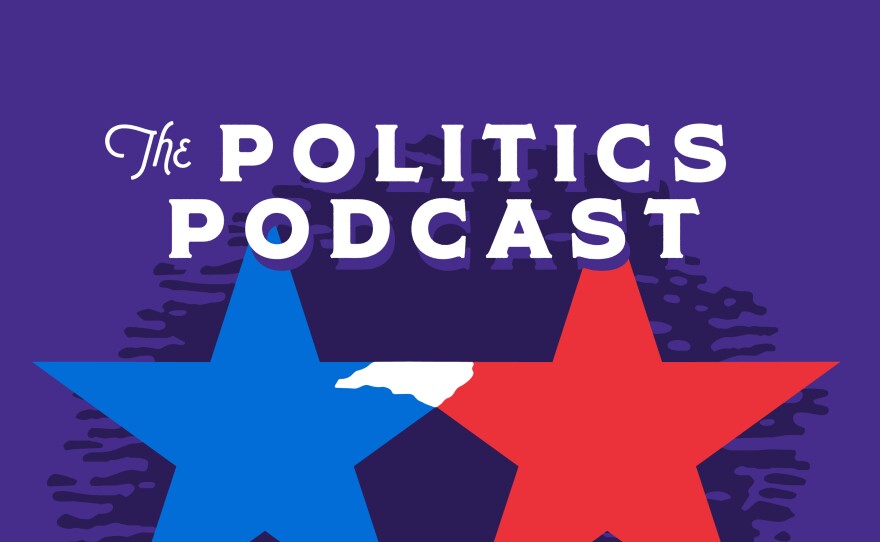Updated at 3:20 p.m.
A GOP bill containing a list of controversial education provisions that was expected to be heard in a state House committee on Wednesday has now been pulled from the agenda.
brings together a collection of politicized policies, making it easier for parents to:
- Challenge school library books and prosecute librarians
- Challenge instructional materials
- Force a superintendent to be dismissed or receive a reduction in pay
- Request for their child to be reassigned to another school or district
- Be informed if their child identifies as transgender or is at risk of suicide
The House education committee introduced many of those provisions Tuesday night in a committee substitute, which is a method for amending an existing bill.
In a press conference held by Democrats Wednesday, Rep. Julie von Haefen, D-Wake, expressed concerns about the bill. She says the legislation “feigns to give rights to parents.” Instead, she says the bill is “a license for book banning committees to run rampant, and groups like Moms for Liberty to get superintendents fired for violations of the quote, fundamental right to parent.”
Von Haefen called the bill a “distraction” from the work of focusing on the budget.
Educators responded to the proposed policies on Wednesday.
“One of my first thoughts when I saw it was I’m so glad I’m already out of the classroom,” says former Wake County special education teacher Taylor Cordes. “I’m so glad I’m not going to have to be navigating how to implement this in the school.”
The bill still contains its original content — which allows school administrators to search a student who may be violating a school policy — as well as some policies that were contained in other bills proposed this session. How the bill would impact education policies
School discipline policies
Public schools would be required to develop discipline policies that avoid discrimination and encourage in-school suspension over out-of-school suspension.
The bill would also remove language in state law that clarified that dress code violations, disrespectful language, non-compliance and minor fights should not be considered serious violations worthy of suspension.
Student advocates have warned the removal of that provision might disproportionately affect marginalized students because the offenses are subjective. This section was reflected in a previous that stalled in the Senate.
Standard Course of Study Advisory Commission
The bill would create a politically appointed commission, with a majority of members selected by the General Assembly, who would set state standards for curriculum. Previously those decisions were made by committees appointed by state education officials. This section was reflected in another that stalled in the Senate.
Student reassignment
Parents would be allowed to request for their child to be reassigned to another school inside or outside of their district. The bill would require for the request to be granted except under certain circumstances. It would entitle parents to a hearing by their local school board if they wish to have their child reassigned to another school in the district. Parents could appeal a decision by the school board to the state Superior Court.
Sex education
Public schools would be required to provide reproductive education programs that do not include information on gender identity, sexual activity, or sexuality. The bill defines what topics are acceptable for fourth, fifth and seventh grade instruction on reproductive health and states that “no further expansions of these subject areas are allowed.”
Instructional materials
School boards would be required to hold public hearings before adopting or modifying textbooks related to health and safety, reproductive health, mental and emotional health or anti-bullying or anti-harassment. The bill would also require a new process for adopting school library books and make it easier for parents to object to new titles.
It would require schools to post detailed syllabi on the school website before the start of the semester and would require schools to provide parents with in-person access to all instructional and supplementary materials.
Prosecuting for materials that are harmful to minors
This provision would make it easier to prosecute librarians and school employees for displaying materials harmful to minors. It would remove schools and public libraries from a list of organizations that have certain protections in state courts.
Public library access
Parents would be able to request the library record of their child at a public library and a parent would have to give permission for a child to receive a library card. Libraries would be required to keep materials that might be harmful to minors in an age-restricted section.
Mental health care and transgender youth
The bill would repeal current state law that allows minors to consent to medical treatment for emotional disturbances. It would create a new requirement for parents to be notified unless the doctor believed the minor was abused or neglected.
Schools would be required to notify parents if their child is at imminent risk of suicide or self-identifies as a gender different from their assigned sex at birth.
The bill would clarify in state law that a parent who chooses to deny medical treatment for their transgender child would not be considered abuse or neglect.
‘Fundamental right to parent’
The bill establishes the “fundamental right to parent” as “the liberty of a parent to direct the upbringing, education, health care, and mental health of the parent's child.”
Superintendents can be terminated or receive a pay cut if they receive five affidavits for violations of the “fundamental right to parent.” Parents who successfully appeal the violation of the fundamental right to parent in superior court are entitled to damages of a minimum of $5,000 as well as attorneys' fees.
Parental consent for extra-curricular activities and health questionnaires
Local school boards would have to establish rules for extra-curricular activities, including parent consent for students to participate in an activity. School boards would have to give parents the opportunity to opt their students out from annual health screenings and well-being questionnaires.
Charter schools are not state actors
This section would clarify that charter schools are not state actors. This relates to the court case Peltier v. Charter Day School, involving a complaint about a charter school that required girls to wear skirts. A state appeals court held in that case that charter schools in North Carolina are state actors.
Here’s a legislative of the .
Editor's Note: The original story inaccurately stated that state senators Michael Lazzara, Amy Galey, and Vickie Sawyer, introduced the new provisions. They introduced the original Senate bill that was amended.








